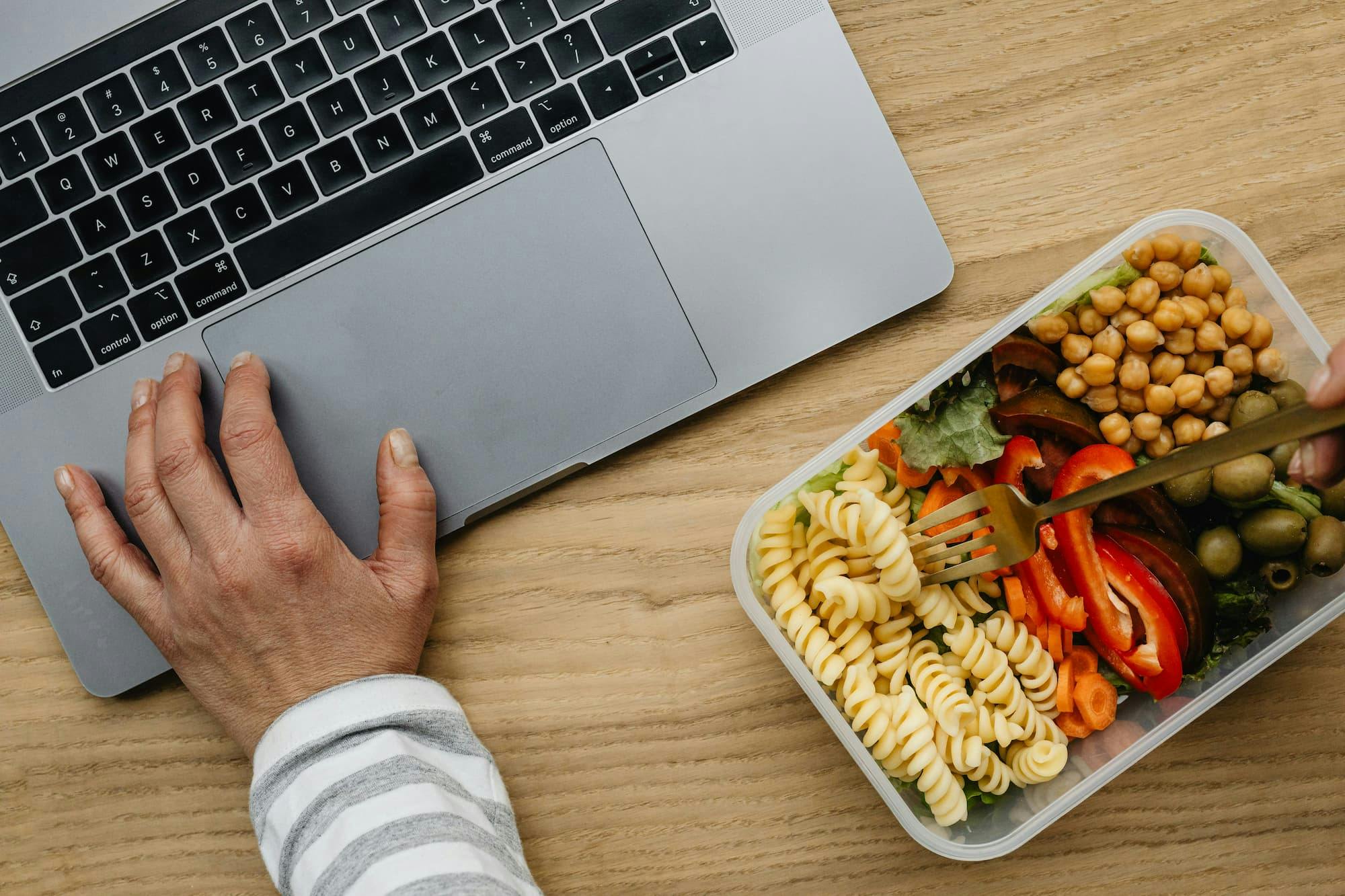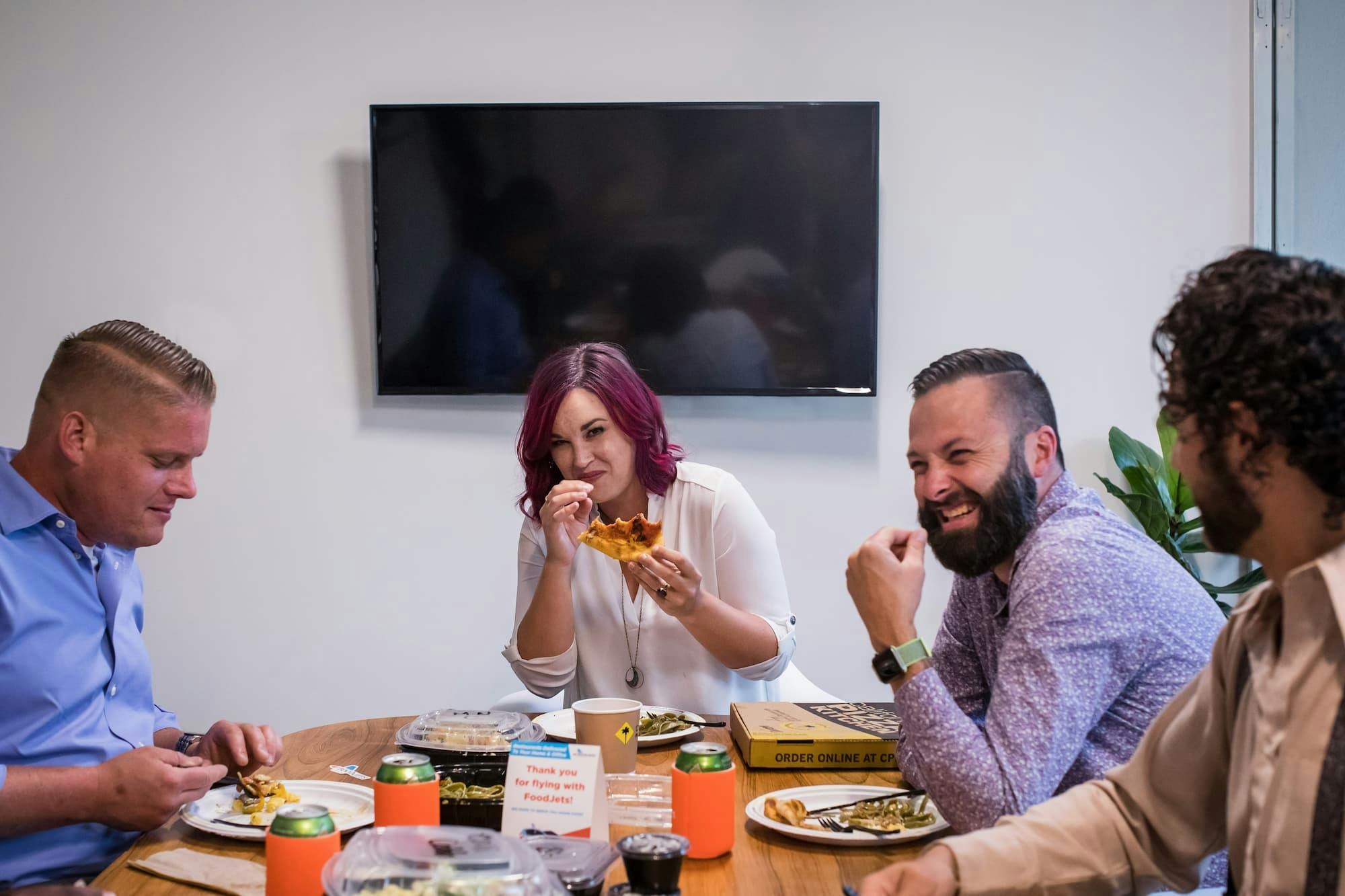When teams eat well at work, they feel better, connect more, and help companies keep great talent around longer. Turns out, investing in office subsidized meals can be a great investment.
Subsidized office meals ROI could sound like just another line on a budget sheet, but let's be honest: food at work means a lot more than that. It's the coffee that sparks a great idea, the lunch that keeps a team project rolling, and the shared table that builds stronger connections.
Companies today are rethinking the role of food in the workplace as part of their broader employee engagement strategies. And while traditional office meal programs can be challenging to manage, platforms like Picnic can make it easier.
This article dives into the real-world benefits of subsidized meals at work, the challenges businesses often face, and how Picnic helps turn corporate food programs into a smart investment—supporting everything from staff retention through perks to tracking the ROI of employee perks.
What Is the ROI of Subsidized Office Meals?
When we talk about the ROI of subsidized office meals, we need to look at the bigger picture. ROI, or return on investment, in this context means understanding what your company gains when it helps cover the cost of meals for employees. And the return goes far beyond basic cost savings.
Subsidizing meals can lead to real improvements in employee satisfaction, time management, collaboration, and even talent retention. It's about investing in daily moments that matter, like making lunch less stressful or creating space for teams to connect. Research from Gallup, for example, shows that highly engaged teams show 21% greater profitability. One of the reasons? Engaged employees tend to stick around longer and perform better.
The ROI of subsidized office meals also includes harder-to-measure but equally important factors like workplace culture and morale—areas where well-designed subsidized meals for employees can make a noticeable impact.
Bring the perfect lunch solution to your office.
Picnic will deliver lunch from 50+ restaurants without fees or tips, directly to your office — available in all major US cities


The Main Benefits Behind Subsidized Office Meals ROI
Understanding the ROI of subsidized office meals means looking at the ripple effect they create across a company. While the upfront cost may seem like just another line item, the long-term value shows up in how people work, connect, and grow within the organization. From saving time to keeping top talent, the benefits of subsidized meals at work go well beyond lunch.
Increased Productivity & Time Efficiency
When employees leave the office to grab food, valuable time slips away, often more than you'd expect. By offering meals on-site or through delivery, companies help reduce those off-site breaks and keep a better flow.
Less time spent searching for lunch means more focus, better energy management, and faster collaboration. According to a report by Tork, 90% of employees say taking a lunch break helps them feel refreshed and ready to get back to work, and 81% say they want their employers to encourage taking proper lunch breaks.
When companies support those breaks with structured office meal programs, they help teams recharge without the stress of long lines, limited options, or rushed decisions, making the workday more productive.
Higher Retention and Talent Attraction
Great food at work might not be the only reason someone joins or stay at a company, but it can make a difference. In competitive hiring markets, employee food benefits signal that a company cares about the experience it offers day to day.
As part of the broader employee engagement strategies, workplace meal subsidies help create a culture where people feel looked after. And that shows up in retention. A study by Glassdoor found that 57% of people consider perks and benefits among their top considerations before accepting a job.
Boosted Employee Engagement & Satisfaction
There's something meaningful about being offered a meal, it creates a sense of being appreciated. Giving employees choice and flexibility through well-structured corporate food programs can improve morale and build a stronger connection between staff and company.
These shared experiences foster team bonds and improve communication. In the long run, these efforts support the bigger goal of ROI of employee perks—meals included—by making people feel recognized, cared for, and more connected to their workplace.
Read more: 5 Benefits of Free Food at Work: How It Improves Employee Wellbeing?

How Picnic Maximizes the ROI of Your Office Meal Program
While the benefits of subsidized office meals ROI are clear, actually managing a meal program can be tricky, balancing budgets, coordinating logistics, and keeping everyone satisfied. Built specifically for the workplace, Picnic makes it easier for companies to offer food benefits for employees without the usual stress.
With thoughtful features and a flexible model, Picnic helps businesses get the most out of their corporate food programs, turning a good idea into a great experience, for both team and managers.
No Fees, No Tips: More Value for Your Investment
With Picnic, what you see is what you pay for. The platform eliminates hidden fees and tip expectations, helping companies stretch their budgets further. Employees also appreciate knowing exactly what their meal costs, no surprise at checkout.
This simple, transparent approach increases the actual value of your workplace meal subsidies, making the entire experience more cost-effective for everyone involved.
Convenient Group Delivery That Saves Time
Coordinating multiple meal deliveries across a team often creates headaches and interruptions. Picnic solves that with group deliveries that arrive together, at a time that works best for the company.
It's a small detail with a big impact: fewer delivery interruptions, meals that arrive fresh, and teams that stay focused. For office managers, it's a relief; for employees, it means a nicer lunch hour with more time to actually enjoy their break.
Variety of Menus for All Tastes
One of the biggest challenges in any employee food benefit is meeting different preferences and dietary needs. Picnic partners with local restaurants to offer a wide selection of meals—including vegetarian, vegan, gluten-free, and more—so everyone can find something they enjoy.
Each employee places their order, choosing what they want, when they want it. That flexibility means Picnic easily adapts to different company sizes, schedules, and team cultures.
Happier Employees, Better Experiences
Food is personal, and when people get to decide meals that match their tastes, they feel seen and appreciated. Picnic empowers employees to pick what they like, which translates into fewer complaints, more satisfaction, and a more positive perception of workplace perks.
That emotional connection contributes directly to the ROI of employee perks, supporting not just productivity, but also staff retention through perks and everyday morale.
Read more: Investing in Employees: Unlock High ROI with 11 Strategic Program Ideas
Why It Pays to Invest in Office Meals with Picnic
Subsidizing meals is a smart move that supports productivity, satisfaction, and long-term growth. When done right, an office meal program becomes more than a perk; it's a daily reminder that a company values its people. And with Picnic, that investment becomes easier to manage, more flexible to scale, and more meaningful for your team.
From removing extra cost to offering personalized meals and seamless group delivery, Picnic turns a complex process into a reliable, people-first solution.
Ready to see the difference? Try Picnic and discover how simple it can be to offer meals that work for everyone.








